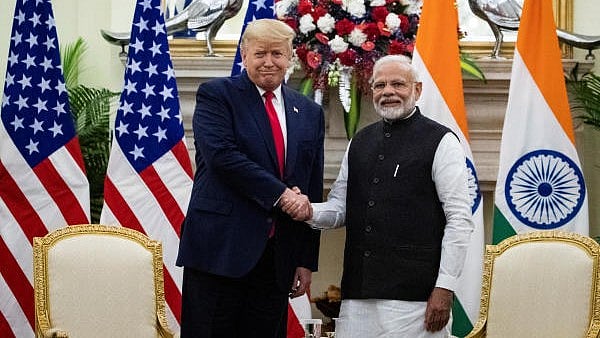
Prime Minister Narendra Modi (R) and US President Donald Trump.
Credit: Reuters Photo
New Delhi: Even as the ASEAN and the East Asia summits in Kuala Lumpur this month may offer an opportunity for a bilateral meeting between Prime Minister Narendra Modi and President Donald Trump, New Delhi remains cautious, given the United States leader’s repeated claims about brokering the May 10 ceasefire between India and Pakistan.
What is also contributing to New Delhi’s dilemma is the possible implications of a Modi-Trump meeting in Kuala Lumpur in the domestic politics just ahead of the state assembly elections in Bihar, particularly in view of the stress in the bilateral relations not only because the 50 per cent tariff the US imposed on India had not yet been withdrawn and the trade deal negotiations could not reach a breakthrough, but also because Washington, DC, disregarded India’s sensitivities and, over the past few months, warmed up to the civil-military leadership of Pakistan.
Trump and Modi will attend the ASEAN and East Asia Summits, which will be hosted by Prime Minister Anwar Ibrahim of Malaysia in Kuala Lumpur from October 26 to 28. With uncertainty now looming over the proposed summit of the Quad in New Delhi, the conclaves in Kuala Lumpur appear to be the only opportunity for the two leaders to hold a bilateral meeting, as the US president will not visit Johannesburg for the G20 meet next month.
Modi recently extended his support to Trump’s 20-point peace plan to end the Israel-Hamas conflict in Gaza. The US president acknowledged the support from the prime minister of India on his Truth Social page. He, however, singled out Prime Minister Shehbaz Sharif of Pakistan and the chief of Pakistan Army, Field Marshal Asim Munir, and lauded them for extending support to his peace plan. He had recently hosted Sharif and Munir in the White House.
A source told DH that in case of a meeting between Modi and Trump on the sidelines of the ASEAN and East Asia summits in Kuala Lumpur, New Delhi would seek to ensure that it would not be used as an opportunity for the US president to once again claim in the presence of the prime minister that he had brokered the ceasefire that ended the four-day cross-border military flare-up between India and Pakistan between May 7 and 10.
New Delhi, according to another source, might also ask Washington, DC, for a partial rollback of the 50 per cent tariff Trump imposed on India’s exports to the US, including a 25 per cent additional duty levied to persuade India to stop buying oil from Russia in view of the sanctions imposed by the US and the European Union on the former Soviet Union nation in the wake of its ‘special military operations’ in Ukraine.
Modi had met Trump in the White House on February 13, less than a month after the billionaire business tycoon returned as the 47th president of India. They had agreed to start negotiations for a trade deal and even set the target of concluding the first tranche of the agreement by the end of the year. The negotiators, however, could not work out a breakthrough and remained stalled for several weeks. Though it has been restarted recently, not much headway has been made yet.
